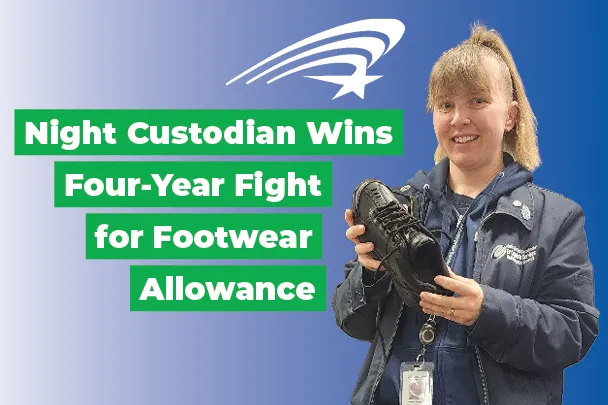Night Custodian Wins Four-Year Fight for Footwear Allowance

After four years of advocacy, Melissa Rossiter, a WFSE local 443 member and night custodian at the State Capitol, finally saw a long-time dream come true: her coworkers receiving the safety footwear they’re contractually owed.
”There were a lot of smiles,” Rossiter said. “I think a lot of people were really happy to get their shoes, and happy that didn't come out of their pocket.”
Rossiter has been a night custodian for the Department of Enterprise Services at the Capitol Campus in downtown Olympia for over six years.
After workplace advocacy cost her a previous job, she knew she needed a union role.
“ I'm well known for getting into ‘good trouble’ a lot,” she said.
As custodians, Rossiter and her coworkers take care of a lot of unseen but critical work.
“We are doing that work that nobody really thinks about,” Rossiter said. “Those are things that just keep the gears moving for the other state workers, the other public servants who have jobs to do as well.”
That Lit the Fire in Me
A few years after beginning her job at DES, Rossiter and her fellow custodians received an email letting them know that the “boot truck” would be coming to their worksite soon. But after asking around, Rossiter learned that only certain shifts of custodial workers were permitted to get footwear from the boot truck. Night custodians were excluded.
“Another email went out that said, ‘Sorry. We meant everybody except the night custodians. Not you guys.’ And that was really what lit the fire in me,” Rossiter said.
During the four years that followed, Rossiter took every opportunity to push for an explanation of this seemingly arbitrary exclusion. After all, night custodians faced the same workplace hazards as their coworkers working the day shift: fatigue and joint pain from long hours of standing, and the risk of slips and falls.
A Question Mark
After her initial complaint, DES management conducted a safety hazard assessment. Their conclusion was that day shift custodians and custodian supervisors should be provided with safe footwear—but no such provision was extended to Rossiter and her fellow night custodians. The assessment acknowledged mopping as a slip hazard, but under the column denoting the appropriate personal protective equipment for the task, there was only a question mark.
Rossiter began to work with the others on night shift to document safety hazards themselves. And at every safety huddle, she raised the issue repeatedly: Why were night custodians the only custodial staff excluded from the footwear allowance?
No one ever had an explanation. As the years wore on, one of Rossiter’s coworkers fell and broke their ankle while cleaning a bathroom. Several others slipped and fell on stairs. And pain and fatigue from standing on the concrete and marble floors of the Capitol Campus was a widespread issue.
“We're one of the lowest paid employees of the state, and so when you can only afford inexpensive shoes, they don't last long,” Rossiter said.
No One is Going to Walk Over Us
Finally, bringing DES’ own safety assessment back to the union-management communication committee won the concession. As had been their contractual due during the entire four years of Rossiter’s fight, the night custodians would be given a footwear allowance, or allowed to choose directly from the boot truck.
“It was really a great day,” Rossiter said.
“I kept saying we were shoe shopping, even though they were at our workplace. There were a lot of smiles, a lot of people pulling out the shoes and looking at them and trying them on.”
Rossiter is a determined champion for working people.
“I've been in the service industry bottom for so long that it's like, you know, I've worked too hard for too long,” she said.
“I'm just not gonna let anybody walk over us anymore.”
She sees solidarity and union membership as a key piece of the puzzle.
Together and United
“We have so much power when we come together and we're united,” Rossiter said. “I can tell you from experience that when you're fighting for yourself and all you have is yourself, it's really easy for your employer to just get rid of you. That's the easier option, rather than solving the larger problem. But they can't do that when we're all united together. They can't get rid of all of us.”
Want to team up with your fellow public employees to make good trouble and right wrongs? Join your union!
